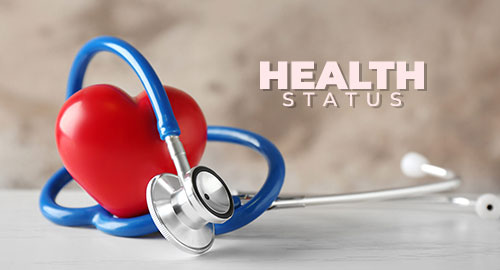- Clinic:
- 0733 945 717
- 0739 434 212

Incorporate healthy actions into your working day
September 7, 2023
Be cautious with health supplements
September 11, 2023Are you constantly aware of your health status?

If you ask people to judge their prevailing health status, you’ll get all sorts of responses. At one extreme, some will claim to be in the best of health. The other extreme is those who are already aware of being in a state of poor health. The majority tend to fall in between, they have no sense of their prevailing health status. They just toddle along hoping for the best.
Health awareness scores poorly when compared to awareness on other aspects of life. A good example is being constantly aware of your financial status. Nearly everyone would quickly appraise you of their financial standing, almost to the bottom cent for some. The same goes for tangible possessions, which tend to be constantly updated in easily accessible inventories for quick references. Why not the same for health status?
There is a default assumption of good prevailing health, even when there is complete ignorance of telltale indicators of poor health. But such assumptions aren’t ever in your best interests. Granted, if you feel well, you are likely in good stead. But feeling well isn’t ever a foolproof way of judging how healthy you are. Proactivity should be the norm, a kind of ongoing surveillance of your actual health status, with appropriate measures to maintain the desired status quo.
In a general sense, the younger you are, the healthier you might be. Coming from a lineage without heritable conditions is a boon. Absence of specific symptoms implies good health. Avoidance of risky health behavior puts you in a healthier category as well. But it isn’t all that simplistic. Many diseases creep up on us without any tangible signals. The only way of being aware of such is heightened awareness, coupled with appropriate disease screening.
You can take simple steps to heighten awareness of your health status. Are there any prevailing diseases in your family that you need to be aware of? Some chronic conditions can be inherited, the sooner you know about them the better. What’s your age? The fourth decade onwards tends to be fraught with all manner of chronic conditions. So called non-communicable diseases, partly related to lifestyles, become more prevalent with age. You must therefore be very cognizant of how you live your life.
Get unusual symptoms checked up quick. Adhere to objective health recommendations emanating from your healthcare provider, or from other health authorities. Make it your duty to be aware of disease screening recommendations that may be appropriate to your circumstances. And ensure strict adherence to screening schedules. If you become aware of disease preventive vaccines, go ahead and get vaccinated.
If you do all the above, you’ll always be aware of your health status. All this doesn’t make you immortal, but it keeps you in control of your health destiny.
Take a fertility test today
